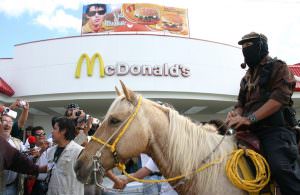Before Mandela Was a Hero, the Right Called Him a Terrorist
As the world mourns Nelson Mandela's death, it also should take a clear-eyed look at his life and the world in which he struggled -- and remember those who aligned with the racist apartheid regime of South Africa.
Remember, before he was a hero and an international beacon of dignity, healing and quiet power, Nelson Mandela was a terrorist — at least in the eyes of the United States and other Western governments that have been lauding him in the hours since his death Thursday at age 95.
They should celebrate Mandela’s life and mourn the world’s loss. But they should also own up to their own institutional support of the very apartheid regime Mandela fought against with such effect. In their opposition to the efforts of Mandela and the African National Congress to unshackle themselves from the racist South African regime, the conservatives of the era often came across as sputtering, frothing lunatics (some are still sputtering).
The British Independent newspaper wrapped up some of the more egregious comments in 1996 as Mandela was about to address both houses of Parliament, and have tea with the queen.
‘The ANC is a typical terrorist organisation … Anyone who thinks it is going to run the government in South Africa is living in cloud-cuckoo land’ – Margaret Thatcher, 1987
‘How much longer will the Prime Minister allow herself to be kicked in the face by this black terrorist?’ – Terry Dicks MP, mid-1980s
‘Nelson Mandela should be shot’ – Teddy Taylor MP, mid-1980s
There were others. Member of Parliament John Carlisle raged at the notion of the BBC broadcasting a concert celebrating Mandela two months after his release after 27 years in prison: “The BBC have just gone bananas over this and seem to be joining those who are making Mandela out to be a Christ-like figure. Many will remember his record and the record of his wife as they take the podium. This hero worship is misplaced.” John Bercow, the current speaker of the House of Commons, was head of the Federation of Conservative Students when it ran a “Hang Mandela” campaign.
The American right was also, well, wrong. Dick Cheney, while in Congress, voted against the Comprehensive Anti-Apartheid Act that included a demand that Mandela be released from prison, a vote he continued to defend years later. Ronald Reagan, as president, vetoed the act (overridden by Congress), calling economic sanctions against the apartheid regime “immoral” and “utterly repugnant.” It should be noted that some Republicans — including Mitch McConnell — joined with Democrats in pushing the sanctions, according to PolicyMic:
Republican moderates deserve credit for having the courage to go against Reagan in passing the Anti-Apartheid Act. Though denounced by conservatives for their actions, they held firm. As a result, the United States directly contributed to the liberation of millions of people from one of the world’s most oppressive regimes. It was a Wilsonian vision of America’s ability to create positive change in the world, and it wouldn’t have happened without Republicans working in common purpose with Democrats. When Newt Gingrich later became Speaker of the House, his partisan leadership style would make such collaboration all but impossible. But that was still eight years away, and for the moment members of both parties could take pride in what they had accomplished together.
Those who preached delay in fighting apartheid often pointed to the hopeless complexity of the situation. But to many Republicans in 1986, the issue was obvious:
“In the 1960s, when I was in college, civil rights issues were clear,” explained Senator Mitch McConnell (R–Ky.), who voted to pass the Act over Reagan’s veto. “After that, it became complicated with questions of quotas and other matters that split people of good will. When the apartheid issues came along, it made civil rights black and white again. It was not complicated.”
Doing the right thing often is simple, though not easy, and one wonders what has happened to McConnell’s clarity since then.
Key to remembering Mandela’s role in the world is to remember the world in which he struggled, when the U.S. government saw communists behind every freedom movement (in truth, sometimes they were, indeed, there). But it was an era in which U.S. foreign policy was based on the premise that it must fight communism around the globe, and in the process, often found itself on the wrong side of history, and morality. Peter Beinart sums it up over at The Daily Beast:
When it came to other countries, Mandela’s leftist ties did sometimes blind him to communism’s crimes. In 1991, for instance, he called Fidel Castro “a source of inspiration to all freedom-loving people.” But at home, where it mattered most, the ANC was a genuine, multiracial movement for democracy. And so the Americans who best championed South African freedom were the ones who didn’t view freedom as synonymous with the geopolitical interests of the United States.
Therein lies Mandela’s real lesson for Americans today. The Cold War is over, but mini-Cold Wars have followed. And once again, American elites, especially on the right, have a bad habit of using “freedom” as a euphemism for whatever serves American power. Thus, American politicians frequently suggest that by impoverishing the people of Iran with ever-harsher economic sanctions, and threatening to bomb them, we are promoting their freedom, even though the people risking their life for democracy in Iran—people like dissident journalist Akbar Ganji and Nobel Prize winner Shirin Ebadi—passionately disagree.
Mandela challenged that. Like Martin Luther King, who publicly repudiated Lyndon Johnson’s claim that Vietnam was a war for democracy, Mandela rejected George W. Bush’s idealistic rationalizations of the Iraq War. In 2003, when Bush was promising to liberate Iraq’s people, Mandela said, “All that he wants is Iraqi oil.” When Bush declared Iraq’s alleged pursuit of nuclear weapons a threat to the planet, Mandela had the bad manners to remind Bush that the only country to have actually used nukes was the United States. Mandela’s message to America’s leaders, born from firsthand experience, was clear: Don’t pretend you are pure.
In short, Mandela’s legacy lies in embracing the moral mandate to speak truth to power.
—Posted by Scott Martelle.
Your support matters…Independent journalism is under threat and overshadowed by heavily funded mainstream media.
You can help level the playing field. Become a member.
Your tax-deductible contribution keeps us digging beneath the headlines to give you thought-provoking, investigative reporting and analysis that unearths what's really happening- without compromise.
Give today to support our courageous, independent journalists.



You need to be a supporter to comment.
There are currently no responses to this article.
Be the first to respond.